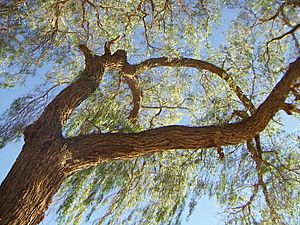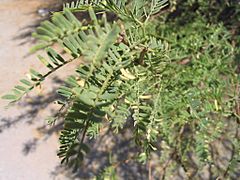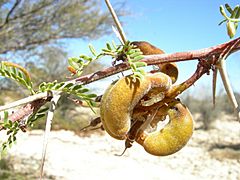Tamarugo facts for kids
Quick facts for kids Prosopis tamarugo |
|
|---|---|
 |
|
| Tamarugo tree | |
| Conservation status | |
| Scientific classification | |
| Kingdom: | |
| (unranked): | |
| (unranked): | |
| (unranked): | |
| Order: | |
| Family: | |
| Genus: | |
| Species: |
P. tamarugo
|
| Binomial name | |
| Prosopis tamarugo Phil.
|
|
The Prosopis tamarugo, often called tamarugo, is a special kind of flowering tree. It belongs to the pea family, which is known as Fabaceae. This tree is quite unique because it grows only in the very dry northern parts of Chile.
Contents
What the Tamarugo Tree Looks Like
Tamarugo trees are usually about 15 m (49 ft) tall. Some can even grow as tall as 30 m (98 ft)! Their trunk can be quite wide, from 50–80 cm (20–31 in) across.
When the tree is young, its branches have sharp spines. The flowers of the tamarugo tree grow close together in groups. Bees help to pollinate these flowers, which means they help the tree make seeds.
Where the Tamarugo Tree Grows
This amazing plant grows only in a place called the Pampa del Tamarugal. This area is about 70 km (43 mi) east of the city of Iquique in Chile.
The Pampa del Tamarugal is a flat plain. It stretches between 19°33' S and 21°50' S latitude. The land here is also quite high up, from 300 to 1,200 km (190 to 750 mi) above sea level.
Even though the Pampa del Tamarugal is a very dry desert, the Prosopis tamarugo tree can survive. It does this by reaching ground water that is not too far below the surface.
How People and Animals Use It
The Prosopis tamarugo tree is very useful!
- Its wood and dry leaves are used as firewood to make fires.
- The wood is also used to make lumber, which is wood cut into planks for building.
- The leaves and fruits of the tree are a good source of food for animals. They are especially important for ruminants like cattle, sheep, and goats.
- The fruits are sweet, and people can eat them too!
Gallery
See also
 In Spanish: Prosopis tamarugo para niños
In Spanish: Prosopis tamarugo para niños
 | Isaac Myers |
 | D. Hamilton Jackson |
 | A. Philip Randolph |




